Straw Dogs Blu-ray Movie
HomeStraw Dogs Blu-ray Movie 
4K RestorationCriterion | 1971 | 118 min | Not rated | Jun 27, 2017
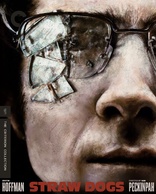
Movie rating
7.7 | / 10 |
Blu-ray rating
| Users | 4.8 | |
| Reviewer | 5.0 | |
| Overall | 4.8 |
Overview
Straw Dogs (1971)
To avoid the Vietnam-era social chaos in the U.S., American mathematician David Sumner moves with his British wife, Amy, to the isolated Cornish town where she grew up, but their presence provokes antagonism among the village's men.
Starring: Dustin Hoffman, Susan George, Peter Vaughan, T.P. McKenna, Del HenneyDirector: Sam Peckinpah
| Drama | Uncertain |
| Psychological thriller | Uncertain |
| Crime | Uncertain |
| Thriller | Uncertain |
Specifications
Video
Video codec: MPEG-4 AVC
Video resolution: 1080p
Aspect ratio: 1.85:1
Original aspect ratio: 1.85:1
Audio
English: LPCM Mono (48kHz, 24-bit)
Subtitles
English SDH
Discs
Blu-ray Disc
Single disc (1 BD)
Playback
Region A (locked)
Review
Rating summary
| Movie | 4.5 | |
| Video | 5.0 | |
| Audio | 5.0 | |
| Extras | 5.0 | |
| Overall | 5.0 |
Straw Dogs Blu-ray Movie Review
Reviewed by Dr. Svet Atanasov July 4, 2017Nominated for Oscar Award for Best Original Dramatic Score, Sam Peckinpah's "Straw Dogs" (1971) arrives on Blu-ray courtesy of Criterion. The supplemental features on the disc include original trailers for the film; audio commentary with writer Stephen Prince; Paul Joyce's documentary "Sam Peckinpah: Man of Iron"; exclusive new filmed conversation with editor Roger Spottiswoode; interview with writer Garner Simmons; and a lot more. The release also arrives with a 24-page illustrated booklet featuring Joshua Clover's essay "Home Like No Place", an archival interview with Sam Peckinpah, and technical credits. In English, with optional English SDH subtitles for the main feature. Region-A "locked".
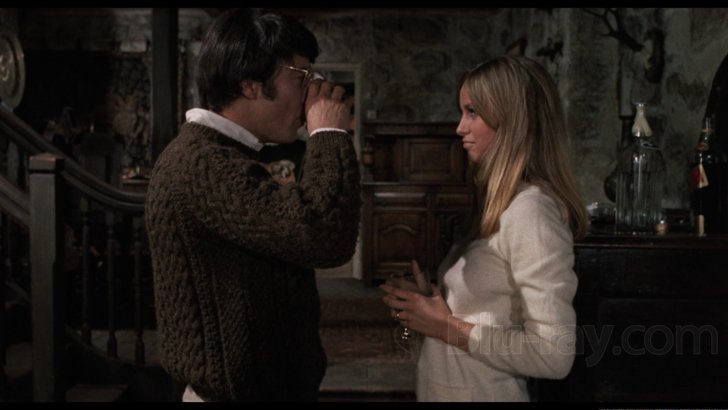
The couple
Sam Peckinpah’s Straw Dogs is one of those rare great films that are impossible to like. Instead of telling a brilliant story, it focuses on the rapid disintegration of an entire range of human qualities that supposedly separate human beings from animals. There are a series of events that prepare its crucial final segment where the violent disintegration occurs, but they are not used to examine the factors that trigger the process. And yet, interestingly enough, this is precisely the reason why the film is so effective -- because at least for a short period of time it completely invalidates the popular notion that when compared to animals human beings emerge as intellectually superior creatures.
There is another more recent film that follows the steps of Straw Dogs to make the same case with even greater authority. It is Gaspar Noe’s Irreversible in which two strangers, both men, are abruptly transformed into animals. In this film, the main objective again is not to seek logical answers that explain the transformation but to temporarily force the audience to the other side, into the animal's state of mind. It is a really good film, but the experience it offers is also impossible to like.
Appreciating what films such as Straw Dogs and Irreversible do, however, is something entirely different. Admittedly it also isn't an easy thing to do because it demands that the audience temporarily abandons the rights and wrongs that typically define what is acceptable and what isn't, but it is what is necessary to rationalize the existence of these films. After that, it comes down to evaluating what the director and the cast were willing to do to make the transition into the animal's state of mind as authentic as possible. The big danger here is that the more effective the film becomes, the greater the risk is of erasing the line that separates fiction and reality -- and these types of films should never go that far.
Despite being a seriously disturbing film Straw Dogs very much remains a safe film. (The ‘controversial’ footage has a very specific purpose and it does not attempt to test any limits. In other words, it was not created for the sole purpose of shock value). It is broken into two uneven acts with the second eventually flipping the mental switch of a group of characters residing in a small town somewhere in the heart of rural England. All but one are locals -- the outsider is an American researcher (Dustin Hoffman) who has married a beautiful girl (Susan George) and the two are now spending time in her late father’s cozy but secluded villa. In the long final segment, the couple is confronted by a group of drunken local bullies after the American angers them by refusing to surrender one of their own.
The film is based on Gordon Williams' good novel The Siege of Trencher's Farm, but it is very much an original Peckinpah project. As clarified earlier, the story it tells is essentially a facade for Peckinpah to unleash a range of extreme emotions that lead to self-destruction. Not surprisingly, out of all the films Peckinpah directed this is the most violent and genuinely unsettling one.
*Straw Dogs was the first film Peckinpah shot outside of the United States. It was also the director’s first contemporary project. (All of his previous films are westerns).
Straw Dogs Blu-ray Movie, Video Quality 
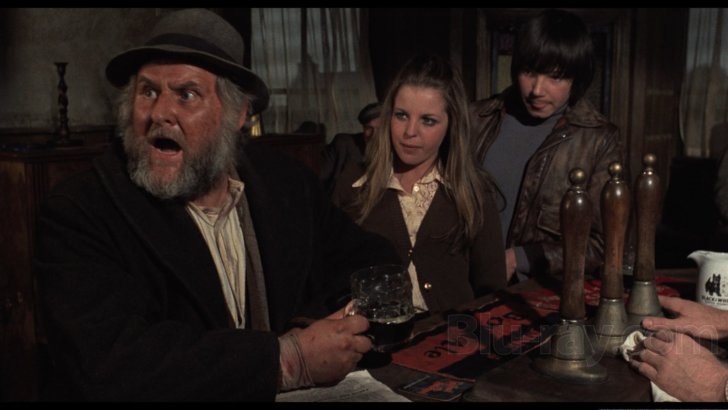
Presented in its original aspect ratio of 1.85:1, encoded with MPEG-4 AVC and granted a 1080p transfer, Sam Peckinpah's Straw Dogs arrives on Blu-ray courtesy of Criterion.
The following text appears inside the booklet provided with this Blu-ray release:
"This new digital transfer was created in 4K resolution on a Scanity film scanner from the 35mm original camera negative. Thousands of instances of dirt, debris, scratches, splices, and warps were manually removed using MTI Film's DRS, while Digital Vision's Phoenix was used for jitter, small dirt, grain, and noise management. The original monaural soundtrack was remastered from the 35mm magnetic track. Clicks, thumps, hiss, hum, and crackle were manually removed using Pro Tools HD and iZotope RX.
Transfer supervisor: Lee Kline, Giles Sherwood, Russell Smith, Roger Spottiswoode.
Colorist: Roman Hankewycz/Harbor Picture Company, New York.
Scanning: The Walt Disney Company, Burbank, CA."
The gap in quality between this brand new release and the older release from MGM is pretty substantial. (I also happen to have a copy of the early Region-B release and a direct comparison with it reveals an even bigger difference). A lot of the darker footage, for instance, boasts much better shadow definition which produces better depth in areas where on the previous release there is noticeable flatness. Overall balance is also improved because highlights and contrast levels are managed better as well. There are no traces of problematic degraining or sharpening adjustments. Colors are healthier and with a superior range of nuances, and though my feeling is that a few primaries should have been just a tad warmer, I find the overall color scheme to be very convincing. Image stability is excellent. Finally, there are absolutely no distracting age-related imperfections to report in our review. (Note: This is a Region-A "locked" Blu-ray release. Therefore, you must have a native Region-A or Region-Free player in order to access its content).
Straw Dogs Blu-ray Movie, Audio Quality 
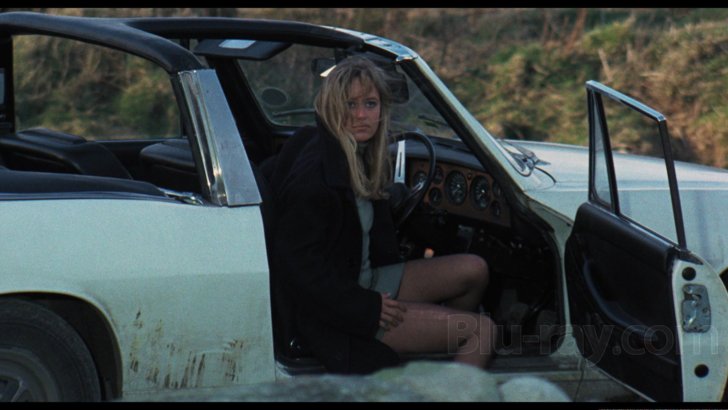
There is only one standard audio track on this Blu-ray release: English LPCM 1.0. Optional English SDH subtitles are provided for the main feature.
It is becoming easier and easier to tell when the original audio of older films is fully remastered, and properly so, because the improvements in terms of depth and fluidity can be quite substantial. (It is clear that the technology that is used to do remixing work has greatly improved during the last 10-15 years). The Mono track on this release is a prime example because it has a very impressive dynamic range and not even a whiff of the type of wear (hiss and especially mid/high-range distortions) that can be heard on original tracks that have not been remastered. Very impressive, indeed.
Straw Dogs Blu-ray Movie, Special Features and Extras 
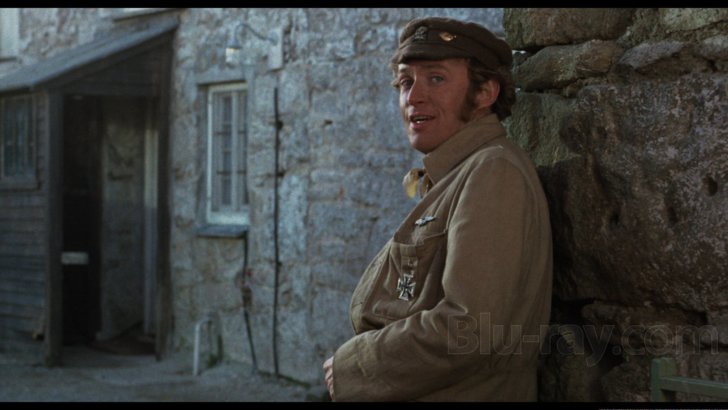
- Trailers - four original trailers for Straw Dogs.
1. Original Theatrical Trailer (2 min, 1080i)
2. TV Trailer One (1 min, 1080i)
3. TV Trailer Two (1 min, 1080i)
4. TV Trailer Three (1 min, 1080i)
- Commentary - in this audio archival commentary, Stephen Prince, author of Savage Prince: Sam Peckinpah and the Rise of Ultraviolent Movies, offers an in-depth analysis of Straw Dogs -- with excellent observations about the various framing choices, the manner in which the action is frequently undercut, and the use film's ambience -- and discusses its critical reception, Sam Peckinpah's role and significance during the Golden Age of American Cinema (late 1960s and 1970s), and some of the films that defined it. The commentary was recorded exclusively for Criterion in 2002.
1, Establishing character
2. Cultural outsider
3. Location/The title
4. Representing violence
5. The marriage as a war zone
6. Backstories
7. Film violence in 1971/Mirrors
8. Peckinpah's editing style
9. Cultural contexts
10. "The territorial imperative"
11. Bad marriages
12. A Turning point
13. Setting the trap
14. The center of the controversy
15. Working with actors
16. Extended subjective interlude
17. The critics respond
18. Cultural conflict
19. Interior/exterior locations
20. "Violence is not casual"
21. Male brutality
22. Action filmmaking
23. Consequences
24. End credits
- Mantrap -"Straw Dogs": The Final Cut (2003) - this documentary film focuses on the production history of Straw Dogs and visits the various locations where the film was shot. Included in it are clips from archival interviews with Dustin Hoffman, actor/dierctor Michael Mundell, actor T.P. McKenna, assistant Katherine Haber, actor Peter Vaughan, writer Gordon Williams, and producer Daniel Melnick, amongst others. The documentary is hosted by film critic Mark Kermode and directed by Paul Joyce. In English, not subtitled. (53 min, 1080p).
- Sam Peckinpah: Man of Iron (1993) - this documentary film focuses on the complex personality and working methods of director Sam Peckinpah. Included in it are clips from various interviews with James Coburn, Kris Kristofferson, Ali MacGraw, Jason Roberts, R.G. Armstrong, screenwriter Alan Sharp (The Osterman Weekend), Katherine Haber, film editor Garth Craven, and director Monte Hellman (Two-Lane Blacktop), amongst others. The documentary was directed by Paul Joyce. In English, not subtitled. (95 min, 1080p).
- Behind the Scenes - presented here is raw archival footage from the production of Straw Dogs, which was shot in 1971. Also included are clips from archival interviews with Sam Peckinpah, Dustin Hoffman, and Susan George. In English, not subtitled. (8 min, 1080i).
- Roger Spottiswoode - in this new filmed conversation, editor Roger Spottiswoode discusses his professional relationship with Sam Peckinpah and the cutting and visual style of Straw Dogs. The conversation was filmed exclusively for Criterion in February 2017. In English, not subtitled. (36 min, 1080p).
- Susan George - in this archival interview, actress Susan George recalls her work during the shooting of Straw Dogs and her interactions with Dustin Hoffman and Sam Peckinpah. (She also tells a very funny story about the day when she was offered to play the character of Amy). The interview was conducted in 2002. In English, not subtitled. (21 min, 1080i).
- Daniel Melnick - in this archival interview, producer Daniel Melnick discusses the production history of Straw Dogs, from the film's conception to the shooting process, the film's reception and consequently banning in parts of England, Sam Peckinpah's working methods and persona, etc. The interview was conducted in 2002. In English, not subtitled. (20 min, 1080i).
- Garner Simmons - in this archival interview, Garner Simmons, author of Peckinpah: A Portrait in Montage, discusses the complex relationship he had with Sam Peckinpah while working on his book, the director's strange inner world and why he and especially his work are largely misunderstood, the emotional makeup of his characters (with specific comments about Dustin Hoffman's character from Straw Dogs and the notorious rape sequence), the manner in which reality is recreated and possibly reshaped in his work, etc. The interview was conducted in 2002. In English, not subtitled. (10 min, 1080i).
- A Controversial Classic - in this brand new video interview, Linda Williams, professor emerita of film and media and rhetoric at the University of California, Berkeley, discusses the role of violence, and sexual violence in particular, in Sam Peckinpah's Straw Dogs, as well as the evolution of Hollywood's ethical code and the manner in which it impacted the films it produced during the years. The interview was conducted exclusively for Criterion in March 2017. In English, not subtitled. (27 min, 1080p).
- Booklet - 24-page illustrated booklet featuring Joshua Clover's essay "Home Like No Place", an archival interview with Sam Peckinpah from 1974, and technical credits.
Straw Dogs Blu-ray Movie, Overall Score and Recommendation 
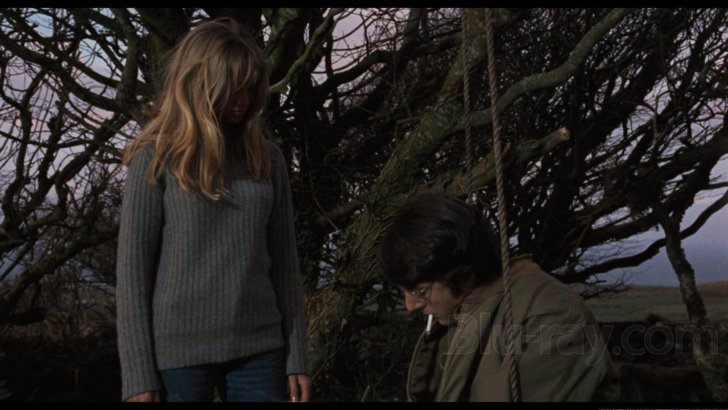
Straw Dogs is exactly the type of film that American directors no longer have the head, heart, and guts to make, and Hollywood will never tolerate. I have never been able to like it because I find it unbearably dark and genuinely disturbing, but ever since I first saw it years ago I have not stopped admiring its brilliance and bravery. Criterion's new Blu-ray release is sourced from a first-class 4K restoration of the film and offers a superb selection of new and archival bonus features. As far as I am concerned, it is unmissable. VERY HIGHLY RECOMMENDED.
Similar titles
Similar titles you might also like

Wake in Fright
1971

Taxi Driver
40th Anniversary Edition
1976

Get Carter 4K
Warner Archive Collection
1971

Cape Fear
1991

You Were Never Really Here
2017

The Conversation
1974

A Clockwork Orange 4K
1971

Tom at the Farm
Tom à la ferme / English packaging / Version française
2013

Night Moves
2013

Child of God
2013

The Offence
1973

M
M - Eine Stadt sucht einen Mörder / German and English Versions
1931

Insomnia
1997

Nocturnal Animals
2016

The Friends of Eddie Coyle
1973

Martha Marcy May Marlene
2011

Cymbeline
2014

We Need to Talk About Kevin
2011

Black Narcissus
1947

The Long Goodbye
4K Restoration
1973
